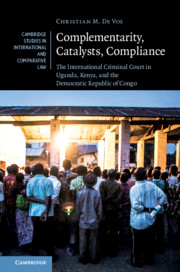 Complementarity, Catalysts, Compliance
Complementarity, Catalysts, Compliance Book contents
- Complementarity, Catalysts, Compliance
- Reviews
- Cambridge Studies in International and Comparative Law: 147
- Complementarity, Catalysts, Compliance
- Copyright page
- Dedication
- Contents
- Acknowledgements
- Table of Cases and Pleadings
- Table of Statutes and Statutory Instruments
- Abbreviations
- Preface
- 1 Introduction
- Part I The ICC and Complementarity: Evolutions, Interpretations and Implementation
- Part II The ICC in Uganda, Kenya and the Democratic Republic of Congo
- 5 Compliance and Performance
- 6 Competing, Complementing, Copying
- 7 Catalysing Opportunity
- 8 Conclusions and Recommendations
- Select Bibliography
- Index
- Cambridge Studies in International and Comparative Law: 147
7 - Catalysing Opportunity
Complementarity and Domestic Proceedings
from Part II - The ICC in Uganda, Kenya and the Democratic Republic of Congo
Published online by Cambridge University Press: 16 April 2020
- Complementarity, Catalysts, Compliance
- Reviews
- Cambridge Studies in International and Comparative Law: 147
- Complementarity, Catalysts, Compliance
- Copyright page
- Dedication
- Contents
- Acknowledgements
- Table of Cases and Pleadings
- Table of Statutes and Statutory Instruments
- Abbreviations
- Preface
- 1 Introduction
- Part I The ICC and Complementarity: Evolutions, Interpretations and Implementation
- Part II The ICC in Uganda, Kenya and the Democratic Republic of Congo
- 5 Compliance and Performance
- 6 Competing, Complementing, Copying
- 7 Catalysing Opportunity
- 8 Conclusions and Recommendations
- Select Bibliography
- Index
- Cambridge Studies in International and Comparative Law: 147
Summary
This chapter considers domestic criminal proceedings in Uganda, Kenya and the Democratic Republic of Congo (DRC) and queries to what extent ICC interventions have catalysed them. As further evidence of the catalysing effect that the ICC’s engagement has had on non-state actors, in particular, the chapter highlights the efforts of Kenyan civil society to pursue other forms of civil litigation as part of the logic of complementarity. Similarly, in the DRC, the use of mobile military courts supported by international NGOs and donors has been a civil society innovation, often invoked as ‘complementary’ to ICC intervention. While not connected to the court in a formal way, these proceedings constitute the largest number of domestic trials for international crimes undertaken by an ICC situation country to date. Finally, the procedural history of the sole trial to thus far come before Uganda’s courts in relation to the ICC’s investigations - that of former LRA commander (and child soldier) Thomas Kwoyelo - is examined. It highlights the vexed relationship between state power and complementarity, demonstrating how formal ‘compliance’ can lead to outcomes that are themselves at odds with human rights norms.
Keywords
- Type
- Chapter
- Information
- Complementarity, Catalysts, ComplianceThe International Criminal Court in Uganda, Kenya, and the Democratic Republic of Congo, pp. 238 - 266Publisher: Cambridge University PressPrint publication year: 2020
